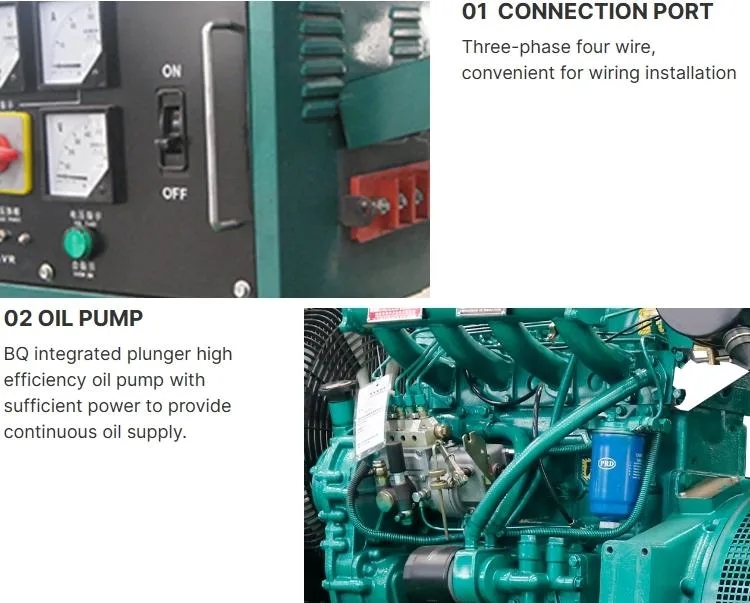Introduction:
In today's modern world, electricity is an essential resource that powers our lives. From industrial sectors to residential areas, a reliable power supply is crucial for uninterrupted operations. However, certain environments, such as humid climates, pose unique challenges to the stability and efficiency of power generation systems. In such conditions, diesel generators emerge as a reliable solution to ensure uninterrupted power supply. This article delves into the intricacies of diesel generators in humid climates, exploring their design, functionality, and maintenance requirements.
1. Understanding Humid Climates:
Humid climates are characterized by high levels of moisture in the air, often accompanied by excessive rainfall and high humidity. These conditions can have adverse effects on power generation equipment, including diesel generators. Understanding 150KW Diesel Generator For Sale of humidity on generator performance is crucial to ensure optimal functioning in such environments.
2. Importance of Diesel Generators in Humid Climates:
Diesel generators have long been recognized as a dependable power source, particularly in regions with unreliable or inadequate grid power. Their robustness, fuel efficiency, and ability to handle heavy loads make them ideal for humid climates. This section highlights the specific advantages of diesel generators in such environments, including their ability to withstand moisture-related challenges.
3. Design Considerations for Diesel Generators in Humid Climates:
a. Enclosure Design: The enclosure of a diesel generator plays a crucial role in protecting its internal components from external elements, including moisture. This section discusses the importance of selecting enclosures with appropriate sealing mechanisms, materials, and ventilation systems to prevent the ingress of water and humidity.
b. Cooling Systems: Effective cooling is vital for any generator, but it becomes even more critical in humid climates. The article explores various cooling systems designed to maintain optimal operating temperatures in high humidity conditions, such as radiator-based systems, heat exchangers, and air-cooled solutions.
c. Corrosion Resistance: Humidity can accelerate corrosion, potentially leading to short circuits, equipment damage, and reduced lifespan of a diesel generator. To mitigate this risk, manufacturers employ anti-corrosion measures, such as using corrosion-resistant materials, protective coatings, and regular maintenance procedures. This section emphasizes the significance of selecting generators with suitable corrosion-resistant features.
4. Fuel Quality and Storage Considerations:
In humid climates, fuel quality and storage practices are crucial factors that can impact the performance and longevity of diesel generators. This section explores the potential challenges associated with fuel quality degradation due to moisture absorption, microbial growth, and contamination. It also delves into best practices for fuel storage, including the use of fuel additives, regular testing, and proper maintenance of storage tanks.
5. Maintenance and Service:
Regular maintenance is essential to ensure the reliable operation of diesel generators in humid climates. This section discusses recommended maintenance practices, including air filter cleaning or replacement, regular oil changes, fuel system inspection, and electrical system checks. Additionally, it highlights the importance of partnering with authorized service providers who possess expertise in maintaining generators in high humidity environments.
6. Ensuring Generator Efficiency in Humid Climates:
a. Load Management: Proper load management is crucial to ensure optimal efficiency and performance of diesel generators. This section emphasizes the significance of load testing, power demand analysis, and load shedding techniques in humid climates to prevent overloading and inefficient operation.
b. Remote Monitoring and Control: Advancements in technology have enabled the implementation of remote monitoring and control systems for diesel generators. These systems allow real-time monitoring of generator parameters, enabling prompt detection of potential issues and remote troubleshooting. The article explores the benefits of such systems in ensuring efficient generator operation in humid climates.
7. Environmental Considerations:
Diesel generators are known for their emissions, which can have environmental implications. This section discusses the importance of adhering to local regulations, implementing emission control systems, and exploring alternative fuel options to minimize the environmental impact of diesel generators in humid climates.
Conclusion:
Diesel generators are a reliable power generation solution for humid climates, offering robustness, fuel efficiency, and load handling capabilities. By understanding the impact of humidity on generator performance and implementing appropriate design considerations, maintenance practices, and monitoring systems, operators can ensure uninterrupted power supply in challenging environments. With advancements in technology and environmental considerations, diesel generators continue to evolve as a sustainable and efficient choice for reliable power generation in humid climates.

